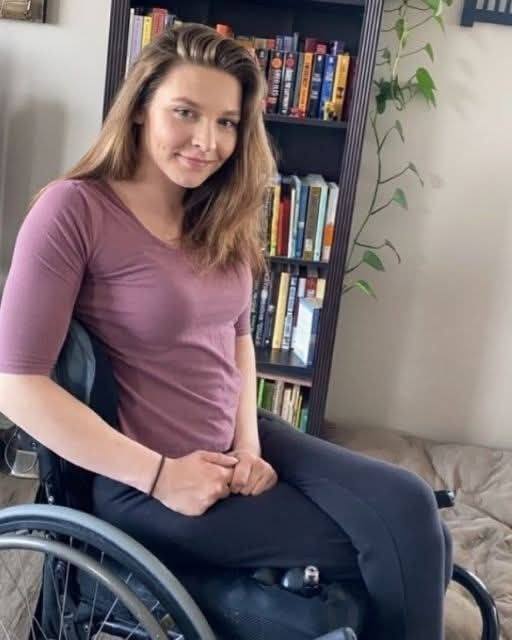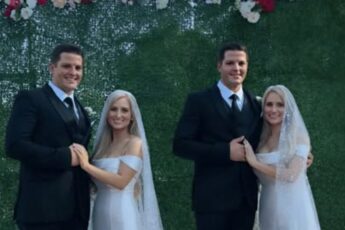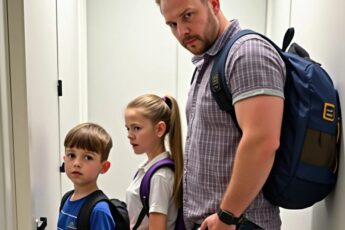When they told me I’d never walk again, I didn’t cry. I just nodded, like they were reading a weather report. Sunny with a chance of paralysis. I didn’t want pity. I didn’t want pep talks. I just wanted space—to grieve something I didn’t yet know how to name.
So when the nurse mentioned I’d need part-time help, I shut it down.
“I’ve got it,” I said.
I didn’t.
The kitchen was a battlefield. Showers were impossible. Dropped spoons became daily defeats.
Then Saara showed up.
She wasn’t what I expected. Younger. No syrupy sympathy. She didn’t talk to me like I was broken. She just asked, “Where’s your coffee?” and started making a cup like she’d done it a hundred times before.
At first, I kept her at arm’s length. No small talk. No personal questions. She came, helped, and left. Simple.
But then I caught myself laughing at one of her ridiculous jokes. I started setting aside books she might like. Articles I thought she’d enjoy. Somewhere along the way, she’d stopped being a stranger.
And then one day, I dropped a bowl. I couldn’t reach it. Couldn’t pick it up. I just sat there—angry and defeated.
Saara didn’t rush to fix it. She sat on the floor beside me and said,
“It’s not about the bowl, is it?”
And something cracked open.
I didn’t want a caregiver. I didn’t want help.
But she made it feel like something else. Like maybe I hadn’t lost everything.
Then she told me she might be leaving.
We sat in the living room, her mug steaming in her hands, hair pulled back in her usual messy bun.
“I’ve been offered a position,” she said, quietly. “A full-time clinic job. Benefits, retirement… the works.”
“That’s… that’s great,” I said, even as my stomach dropped.
“It’s not here,” she added. “It’s three hours away.”
Just three hours. But far enough to mean that this—whatever this was—would be over.
I wanted to say, Please don’t go. I need you.
But instead, I smiled and said, “You can’t pass that up.”
She asked if I was mad. I told her I wasn’t. I lied.
The next few days, I dodged every conversation about it. I said I’d be fine. That I’d figure things out.
But I was scared.
Scared of going back to the way things were before she walked into my life and quietly, stubbornly, refused to let me disappear.
One afternoon, she pulled out a photo of me from before the accident—hiking on a mountain, smiling like I’d just stolen the sun.
“You look so happy here,” she said.
“I was,” I replied, fingers tracing the edge of the picture. “Now I’m lucky if I make it to the mailbox.”
She paused. “Do you miss it?”
“Of course I do,” I snapped. Then softer, “But it doesn’t matter. I can’t go back.”
“No,” she said. “But maybe you don’t have to go back. Maybe you just… go forward.”
She told me about adaptive sports. Wheelchair basketball. Hand-cycling. Even rock climbing.
“I looked into it last week,” she said. “Thought you might be interested.”
“Why would you do that?” I asked.
She just looked at me and said,
“Because I care about you. And because you’re stronger than you think.”
A week later, she drove me to the adaptive sports center.
It was loud. Bright. Alive.
And for the first time in a long time, I didn’t feel broken—just challenged.
I started small. Wheelchair basketball. I sucked at first. Fell over once. But Saara cheered like I’d just won gold every time I dribbled without crashing.
Week by week, I got stronger. I tried hand-cycling. I signed up for a rock-climbing class. I learned how to sweat again. How to laugh again.
And then—she left.
Her last morning, we didn’t say much. She hugged me hard. I hugged her back harder.
That night, I played my first real match. We won.
I looked into the stands—and there she was.
She came back. For one last cheer. For me.
After the game, she found me and said,
“See? Told you.”
I hugged her. “Thank you. For everything.”
She smiled. “Just promise me one thing.”
“What’s that?”
“Keep moving forward.”
And I promised.
Because sometimes, the people who show up when we least expect them end up showing us who we truly are.
If this story moved you, share it. Someone out there may need the reminder that connection isn’t weakness—and that healing doesn’t always look like going back. Sometimes it’s about learning how to move forward. ❤️






